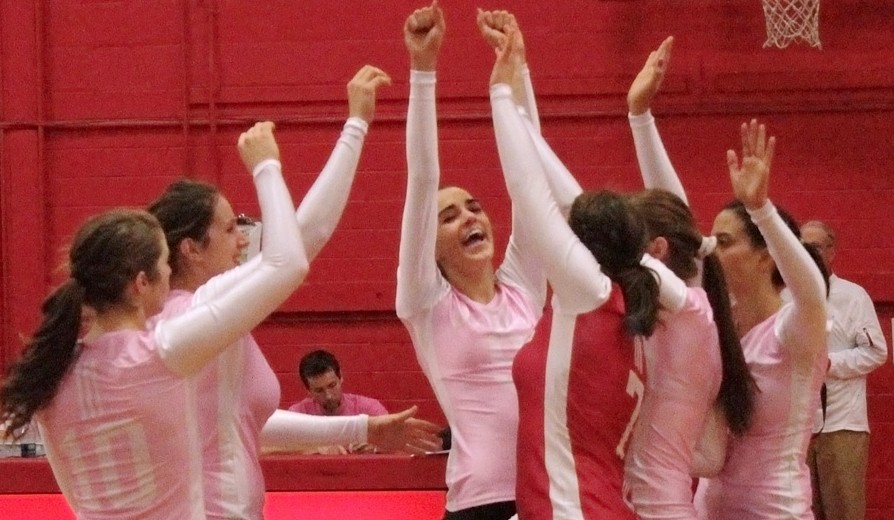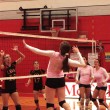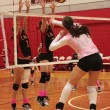The McGill Martlets hit the court on Friday evening looking to take down the Laval Rouge-et-Or after losing to them earlier in the month. The Martlets dressed in pink in support of the Quebec Breast Cancer Foundation for McGill’s annual Dig for the Cure Night. They had an energetic, but inconsistent performance in front of the packed stands at Love Competition Hall. Despite the solid effort, McGill (4-6) fell to Laval (8-2) for the second time this year, three sets to one.
Both the Martlets and the Rouge-et-Or started off strong in the first set, and traded points early on. However, the Martlets sagged following the technical timeout, paving the way for Laval’s scoring run. The Rouge-et-Or won the first set 25-19.
McGill turned things around in the second, however, creating an early lead before settling into a tight set with Laval. The Martlets relied heavily on scramble plays, and capitalized on their offensive opportunities to win the set 25-22. Fifth-year setter Marcela Mansure finished the match with 36 assists, many of which went to captain Geneviève Plante, who tacked on 13 kills and one ace in the game. Mansure praised McGill’s offensive approach against Laval.
“Hitting-wise, we did well. We tried different options. We weren’t [always] hitting the same thing because Laval is a team that adjusts very quickly. Our hitters were able to switch it around… [and] try different things,” Mansure explained.
After losing the third set in which the Martlets appeared disjointed due to defensive communication errors, McGill came out roaring to start the final game. With the crowd behind them, the Martlets battled the Rouge-et-Or on each point and hustled on digs, which led to offensive chances. However, their opponents played a stellar defence, and the Rouge-et-Or registered 7.5 team blocks to McGill’s two. In the end, Laval pulled away in the set, and won 25-19, despite a late rally by the Martlets.
McGill has been fairly inconsistent so far this season. At times, the Martlets have played smartly and efficiently on both offence and defence. However, Head Coach Rachele Beliveau recognizes McGill’s tendency to give up leads, or fall behind after making mistakes.
“We started [the game] really well. It’s when we started to miss some serves that we were [bothered] mentally. Then we didn’t play as intensively. And then we started [questioning ourselves] … and [when] we do that we are not playing the same game,” she said. “We still played a decent game, but not … the same fluid game.”
Plante agreed that the Martlets’ inconsistency has been crucial in their struggles as a team, and added that youth may be a factor.
“We were up and down all game. When we played together we were really strong, and I think it showed. We put the pressure on the other team, and they struggled with what we were doing,” she said. “But we’re a really young team, so it’s hard for us to stay consistent with our intensity.”
The Martlets need to fix some of their problems in their play if they wish to stake a claim for the RSEQ title. They must work on improving their serving percentage and first contacts, both of which are integral to executing game plans.
However, as the season wears on, the team—which boasts a good mix of youth and veteran talent—should begin to mesh and put together more consistent efforts.
McGill fell again to the Montreal Carabins on Sunday three sets to one. The team looks to bounce back on Nov. 23 against Memorial University at Love Competition Hall.












